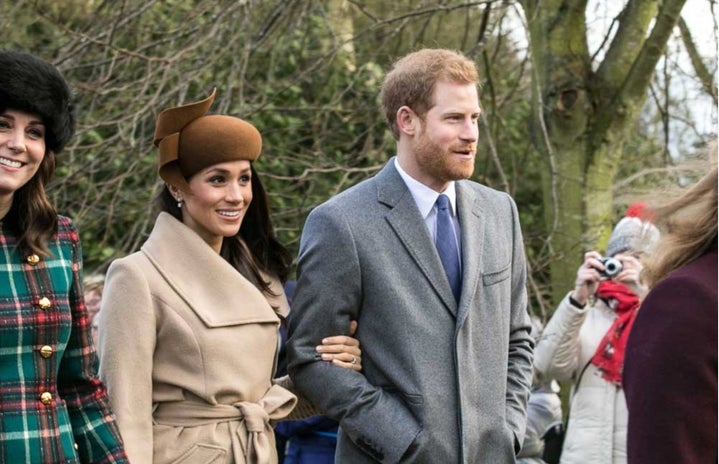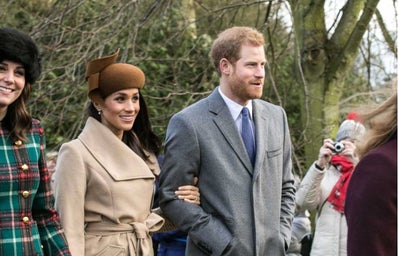Two women, both alike in dignity… yet one receives a steady stream of approval and complimentary articles from the press, and the other receives the sort of press attention that scrutinises her every move, scapegoats her for her in-laws’ issues, and whips up a feeling in a large percentage of the population so negative that it results in her being the victim of constant vitriol.
Why is it that the British press love Kate Middleton – doting mother and elegant wife to Prince William – and hate Meghan Markle – crude American-actress-turned-gold-digger and all-round bad influence on the country’s beloved Prince Harry?
It seems the Duchess of Sussex can do nothing right, whilst the Duchess of Cambridge can do no wrong. Around the time of the Duke and Duchess of Sussex’s first pregnancy announcement in 2019, screenshots comparing tabloid articles on Meghan and Kate and their obvious difference in tone went viral on social media.
A Daily Mail expressing excitement over Kate being due ‘any minute now’ with Prince Louis, picturing her cradling her bump ‘tenderly’, was juxtaposed with images of Meghan posed in a similar manner – though this time, the Mail asked if Markle’s bump-holding was a sign of ‘pride, vanity, acting, or a new age bonding technique’.
This is just one example of dozens that clearly show the media’s disdain for Meghan, only exacerbated by their comparative love of Kate.
Some of the articles published online and in tabloids about Meghan are downright ridiculous and spiteful, from implying she is somehow party responsible for ‘human rights abuses and droughts’ by liking avocados, to asking if Harry’s hair loss could be blamed on his marriage.
So why, then, when the media constantly pumps out venom about them, are the Sussexes chastised and branded attention-seeking by the likes of Piers Morgan and his posse of Twitter followers when they make the decision to take action against the media and withdraw from royal life?
It only takes a brief look at Mr. Morgan’s bevy of comments on the couple to see the misogyny that pervades most discussions about Meghan Markle. She is, to him and others like him, a devil-woman, who has made Harry stray from the light. She, in all her seductiveness, has turned him against his family, against his country; against, they claim (disgustingly), what his mother would have wanted for him.
They portray Harry often as an infantilised victim of his controlling wife, seemingly still thinking of him as that cheeky, red-headed young boy that he was in the 90s, and not as the 36-year-old grown man that he is, perfectly capable of making his own decisions.
The royal family is in itself an archaic tradition, and with it comes, arguably, an archaic way of thinking. Those who support the existence of the royal family are also perhaps more likely to hold outdated views on women, race, and ideas of national identity.
Meghan Markle is threatening to all of these beliefs in a way that Kate Middleton is not. Whilst Kate stirred up some controversy for being a ‘commoner’, her family was still extremely well-off, and she attended several top private schools. Her home life was seemingly perfect, with her good-looking siblings and immaculately dressed parents making headlines themselves when they rocked up to her wedding in 2011.
Meghan Markle, on the other hand, grew up in Los Angeles, not particularly wealthy, with a black mother and a white father. Whilst Markle’s mother attended her wedding, her father and siblings did not, all of them instead taking to the media to criticise her. Her father went as far as to stage piteous paparazzi pictures of him sitting alone in a café, reading a book called ‘Images of Britain’, a castle on its cover.
Though most of Meghan’s critics claim their hatred has nothing to do with her proudly identifying as mixed race, the fact that she isn’t white is yet another reason why she does not fulfil the fantasy that many royalists still cling to.
Could a strong-willed black woman ever really be compatible with an institution that has been and remains symbolic of colonialism?
The narrative ascribed to Kate, with her ‘normal’ childhood, royal romance at university, and happily ever after with her Prince feels at once fairy-tale-like and yet somewhat within reach, thus satisfying the British public’s need to see ‘someone like them’ succeed.
Meghan Markle, from the far-flung coats of California, of a different skin colour to the 86% white UK population, and from a broken home, does little to satisfy fans of the royals who have waited to witness the love-lives of the princes unfold ever since they were young.
Perhaps it seems Markle is undeserving – this role of Harry’s wife was supposed to be reserved for somebody like them. Somebody white, somebody British.
It’s truly shocking that such a large chunk of the British public still clings to the myth of the royal family, even after the events that unfolded with Harry’s own mother. It’s even more shocking to see history repeating itself; the media treating women as they have always done, the public feeding into its toxicity.
The Royal Family feel so distant and untouchable that they don’t feel real – they’re like an ensemble cast, mere characters in our favourite TV show. And in every TV show there are heroes and villains – whilst Kate is a ‘goodie’, the love interest the audience roots for, Meghan is the evil temptress who has led the main man astray, and viewers will always be hoping for his redemption arc.



